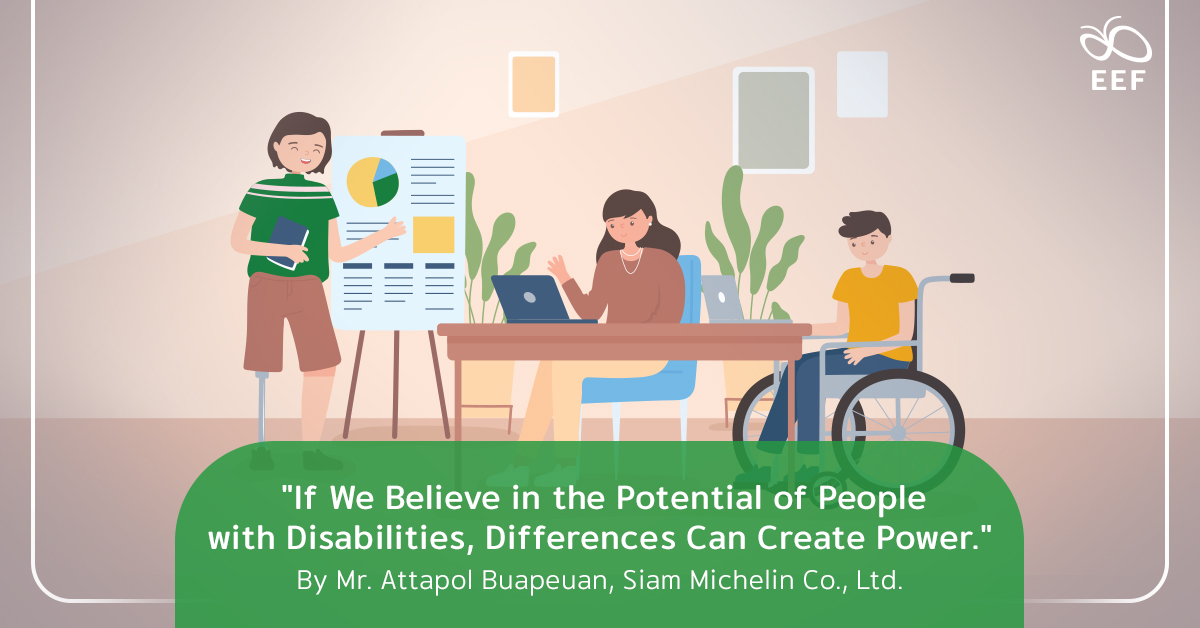
“We want to create ‘opportunity spaces for everyone’ through employment based on diversity, but it turns out that the biggest challenge for HR is that we don’t know where to find our colleagues?”
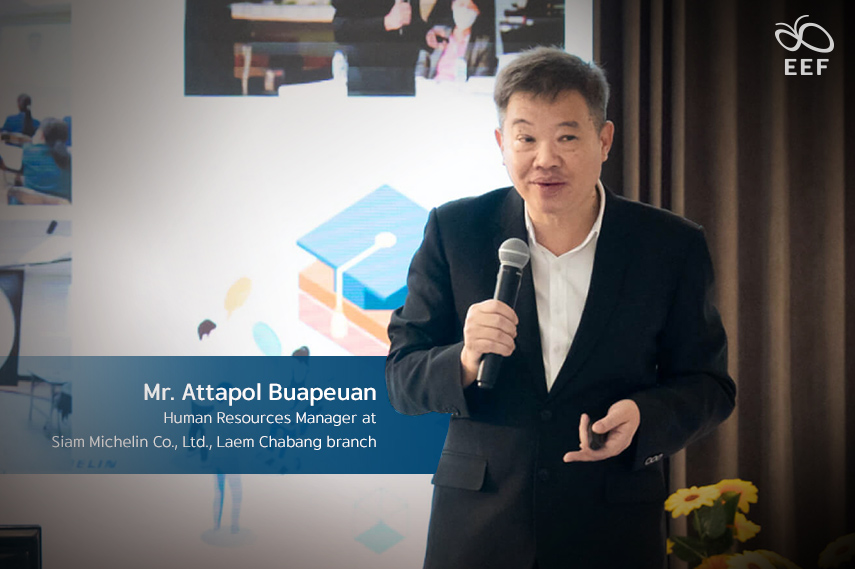
Mr. Attapol Buapeuan, Human Resources Manager at Siam Michelin Co., Ltd., Laem Chabang branch, a representative of private sector entrepreneurs participating in the High Vocational Innovation Scholarship Program for students with special needs under the Equitable Education Fund (EEF) Thailand, highlighted that the company’s ‘Diversity and Inclusion’ employment policy does not restrict employment qualifications based on age, gender, disability, or any other differences. However, when the policy was implemented, it took a considerable amount of time for the Human Resources (HR) department to find viable ways to support employment opportunities for people with diverse characteristics before they found ’employees with potential and suitable qualifications.’
“Many companies faced the same problem. We all wanted to work with diverse people, especially those with disabilities. Particularly in the manufacturing industry, where automation plays a significant role today, we believe that everyone can work and succeed equally, provided they have the potential and dedication. However, when we opened for applications, it turned out to be difficult to find them.
“…The key issue is discovering these groups of personnel. We can’t just wait for them to come to us.”
‘The shortcut is to connect directly with educational institutions.’
Due to such limitations, the HR team at Siam Michelin, Laem Chabang, shifted their approach to a ‘proactive search’ by collaborating with the Chonburi Provincial Labour Office, eventually linking with Bangsaen Technical College and Pattaya Redemptorist Technological College for People with Disabilities, which are part of the ‘High Vocational Innovation Scholarship Program for students with special needs’ network by EEF Thailand, the Office of the Vocational Education Commission (VEC), and the Faculty of Education at Chulalongkorn University. This collaboration aims to promote youth with disabilities who have potential but lack financial resources and opportunities to further their education to high vocational certificate level, focusing on expanding their employment opportunities through ‘Collaboration’ between vocational institutions and the private sector as social partners.
“Encountering vocational institutions allowed us to see the possibilities for long-term collaboration. After our HR team met the students at the institution, we discovered that several scholarship students were ready to start internships and work immediately. At that point, we realized we were in the right place and on the right track, so we consulted with the institution’s director about joining the project to set directions for producing and developing these students collaboratively.”
This collaboration marked the initial convergence of the ‘pathway’ to systematically develop the skills necessary for employment for High Vocational Innovation Scholarship Program students with special needs. The vocational institutions took an active role in identifying, screening, and selecting dedicated disabled youths to enter into cultivating knowledge and work skills, including refining various essential attributes for employment and covering social skills and self-reliance in various aspects. Meanwhile, businesses play the role of the ‘final link’ in the production chain for personnel development, preparing them to progress fully on their extended career path.
“As the system gradually took shape, we could finally go back and solve the initial problem of where to find these colleagues and what needed to be done for ‘them’ and ‘us,’ both the businesses and vocational institutions, to meet. This meant businesses and vocational institutions would have to find ways to collaboratively help create and pass on this inspiration, ensuring the system could establish itself as part of the development of disabled personnel, even after the program eventually concluded.”
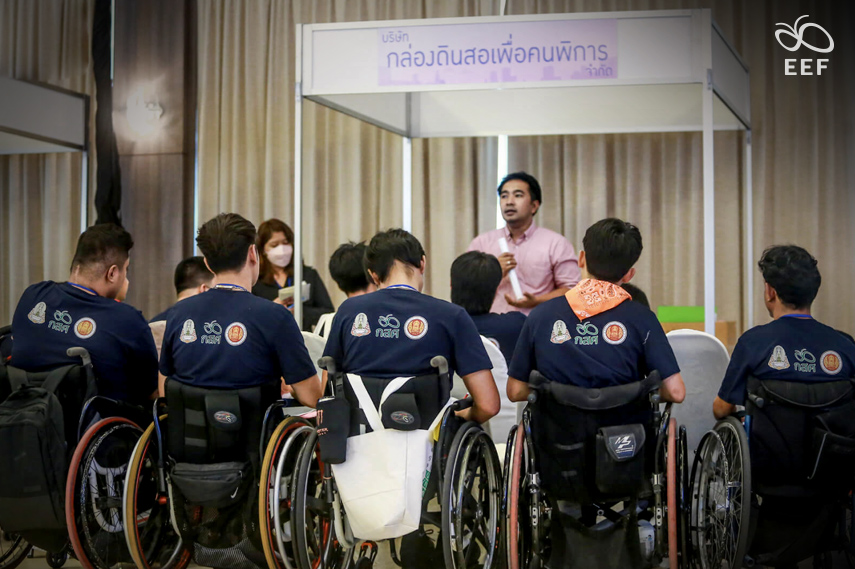
“Together as One,”
From the first year (academic year 2023) that Siam Michelin, Laem Chabang branch, accepted 6 scholarship students to work, they have now graduated and been fully employed. For the academic year 2024, Siam Michelin is preparing to accept another 11 new scholarship students and is advancing the promotion of the project’s outcomes for broader awareness to expand opportunities for collaboration with groups of disabled people, not limited only to scholarship students in the program.
In the long-term development plan for personnel production, the HR manager of Siam Michelin stated that the key principle of working based on diversity is, firstly, ‘We must believe in the potential of every human being.’ The second principle is ‘It’s not just about finding and hiring, but the workplace must adjust, help prepare, and integrate all personnel into one entity.’ to make living and working together grow as naturally as possible.
“Safety is what we prioritized. So before accepting scholarship students, there is a multi-party analysis of the factory’s interior space, especially the opinions from educational institution administrators and the students themselves, leading to small adjustments such as installing Blacklight in the work area to bigger adjustments like training existing employees to have co-worker skills to mentor scholarship students during their training period. Regarding the employment process, everyone must go through an orientation, a trial period, and a process similar to that of regular employees. There is no difference.
“Our past collaboration has shown us that developing a hiring system for the disabled is not difficult if importance is given to inclusivity or being ‘Together as One’ because whether normal people, disabled people, the elderly, or anyone else, everyone must go through an ice-breaking process, fine-tuning their social skills, and should receive equal care.
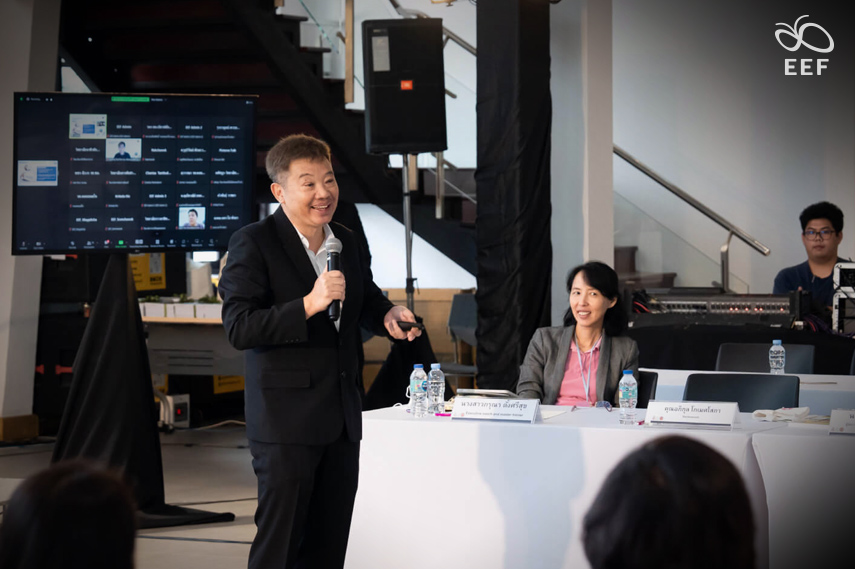
“Many visitors came to observe our operations. I told them not to worry. With an open mind and overlooking the limitations, they will realize that humans can adapt to each other. At our factory now, almost everyone, including supervisors, employees, and even the vendors in the factory, can use sign language without additional training. Their instructors are the disabled youths who came to intern with us. These things happen; naturally, you have to give them time to adjust to each other.”
“Because we believe that diversity is power,”
In the academic year 2023, Siam Michelin Co., Ltd., Laem Chabang branch, not only served as a destination for scholarship students but also became an integral part of ‘curriculum design’ in full collaboration with the vocational institutes to increase opportunities for scholarship students to earn credits from internships. Additionally, the company has designated areas within the factory as accommodations and educational buildings.
The HR Manager of Siam Michelin revealed that collaborating with the originating institutes is gratifying for the business because it allows us to meet the students while they are still studying. This timing is perfect for growth and development, enabling each scholarship student to discover skills, refine their attitudes, and learn to overcome their limitations through ‘real work experience’ which will help pave the way and refine various qualities until they are fully ready to enter the workforce immediately upon graduation.
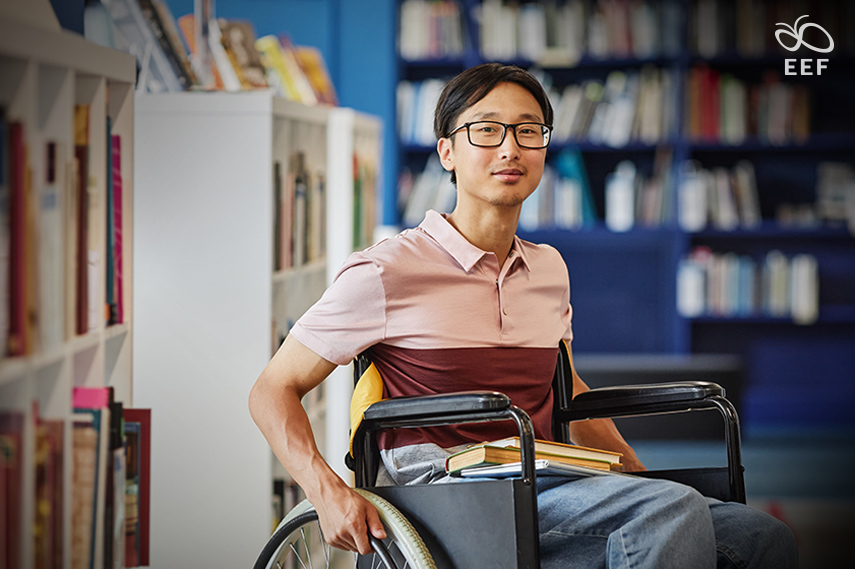
“Because ‘Diversity and Inclusion’ are what we desire, to invite a diverse group of people to work together, based on the belief that ‘Diversity is Power’. Today, we have wheelchair users working in the machinery maintenance unit, individuals with hearing impairments in the production line, and physically impaired persons proficient in foreign language communication in the Quantity Surveyor (QS) position to evaluate the costs of various projects. These are just the starting points, affirming that we are ready to work with disabled individuals and anyone seeking opportunities, ensuring that diversity is no longer a barrier.”
Credit: Rawis Larha | Content and Writer Production Officer
Source: (High Vocational Innovative Scholarship Program for students with special needs) “If We Believe in the Potential of People with Disabilities, Differences Can Create Power.” https://www.eef.or.th/article-200124/

